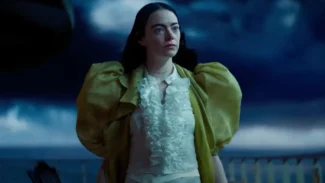Poor Things (Yorgos Lanthimos, 2023): Ireland, United Kingdom, United States, Hungary
Reviewed by Sven Schubert. Viewed at the Santa Barbara International Film Festival 2024.
 Emma Stone is having a lot of sex. Really lots. And the camera in Poor Things, directed by Yorgos Lanthimos, is not afraid to show it. Over and over again. With lots of different guys. Sometimes even for money.
Emma Stone is having a lot of sex. Really lots. And the camera in Poor Things, directed by Yorgos Lanthimos, is not afraid to show it. Over and over again. With lots of different guys. Sometimes even for money.
In 2024, the world has long moved beyond the tantalizing question this film would have raised some decades ago: is this pornography or art? Is this even legal? These days, the film poses a different question: why all of this? And why does Emma Stone, a legitimate Hollywood A-lister who certainly does not have to put in some nudity to boost attention, do it?
As with all great pieces of art, the film defies an easy answer. I have spoken to some who found the movie offensive and the sex scenes meaningless. Others – and I am part of that team – praise the unfiltered exhibition of sexuality as an integral part of a kaleidoscopic storytelling about human nature (and the sex drive is certainly an important aspect of the human nature).
Poor Things tells the somewhat surreal story of Bella Baxter (Emma Stone, in a career-defining performance, rightfully nominated for an Academy Award for best actress) of a young woman who commits suicide while being pregnant who is then brought back to live by the border-line insane surgeon Dr. Godwin Baxter (Willem Dafoe, in a career-resurrecting performance, unfortunately not nominated for an Academy Award) by some Frankensteinean procedure, planting the unborn baby’s brain into Bella’s skull. As a consequence, Bella is suddenly reduced to the mental capacity of an infant. Surrounded by some other surreal hybrid creatures made by Dr. Baxter (Bella appropriately refers to him as “God”), Bella learns fast. Speech and body coordination, clumsy at first, is being mastered quickly and soon Bella discovers sexuality. Not quite yet equipped with the mental training required to navigate through late 19th century’s uptight London society, Bella says and does things with a childish, naïve and disarming directness, wreaking social havoc wherever she goes. At this stage of Bella’s rapid metamorphosis, she serves as an unfiltered mirror of the pretentiousness of the upper class, which, as embodied by Baxter’s lawyer Duncan Wedderburn (Marc Ruffalo, also with an Academy Awards nomination for best supporting actor) who takes Bella on trip to a large than life, allegoric version of Lisbon (flying trams anybody?), despite its polished manners, is interested in satisfying its perverse pleasures only – or is it okay to engage in “furious jumping”, as Bella calls it, with a person who has the development level of a grade student?
But Bella quickly ceases to be a child and surpasses the adults around her to become a cool, analytical intellectual and warrior for social justice. At this development stage and under tutelage of a Madame in Paris (played by an amazing Kathryn Hunter), Bella now dissects and disposes of any form of pretentiousness. In her sexual acts, she lays bare humanity with all of its twisted turns.
The superb and exuberant cinematography (Robbie Ryan, another Academy Awards nominee for Best Achievement in Cinematography) adds to the air of surrealism. On her voyage through Europe, Lisbon, Paris and the mediterranean cruise ship she stays on all have a vague resemblance with the real thing but then they don’t. The cruise ship looks like from a fantasy movie and so does the dramatically accentuated sky.
But don’t fall for this trap. Despite all of its surrealism, Poor Things is a very real. It is clever, highly creative, sharp analysis and criticism of the abyss of the human soul, its cravings and the society we humans live in. Sexual abuse, mortal ambition beyond all ethical considerations, the exploitation of the underclass, it is all there, thanks to the screenplay by Tony McNamara (also with an Academy Awards nomination for best adapted screenplay). And Emma Stone exposes it all by going all in, without any protective layers (literally and figuratively). A masterpiece.
About this entry
You’re currently reading “Poor Things (Yorgos Lanthimos, 2023): Ireland, United Kingdom, United States, Hungary,” an entry on Student Film Reviews
- Published:
- 02.27.24 / 10am
- Category:
- Films, Santa Barbara Film Festival 2024
7 Comments
Jump to comment form | comments rss [?]